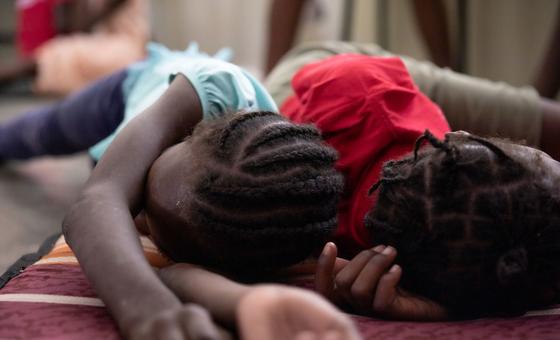
“This is not just another wave of insecurity; it is a dramatic escalation that shows no signs of abating,” emphasised Miroslav Jenča, Assistant Secretary-General for the Americas at the Department of Political and Peacebuilding Affairs.
The country is now in its third year of political transition following the assassination of President Jovenel Moïse in 2021.
“We are deeply concerned about the slow progress on Haiti’s roadmap for restoring democratic institutions,” Mr. Jenča said, underscoring “time is of the essence.”
Gangs advance
Earlier this month, on the day of the new Prime Minister Alix Didier Fils-Aime’s installation, “a series of shocking incidents unfolded as four commercial aircraft were struck by gang-related gunfire,” Mr. Jenča recounted, causing Port-au-Prince’s International Airport to close and severely restricting access to the capital.
“This is the second time this year that armed gangs exploited moments of political instability to tighten their stranglehold on Port-au-Prince by targeting the airport,” he warned, as armed groups further intensify their “coordinated and well-orchestrated attacks”.
They have encircled the capital and all access roads, and made territorial advances in strategic areas, now controlling around 85 per cent of the nation’s capital.
“They are also attacking the remaining pockets of relative safety, increasingly including government buildings and infrastructure,” he added.
Effects on civilians
Raising alarm about the human rights of people in these gang-controlled areas, Mr. Jenča reported how “predatory armed gangs systematically attack communities, using extreme forms of violence, including sexual violence, as a weapon to subjugate them.”
“We condemn in the strongest terms the widespread sexual violence used by armed gangs,” he stated.
20,000 people have fled the gang violence in just four days in November, augmenting the 700,000 internally displaced persons in Haiti and leading to a “staggering rise in displacement”, he added, in accordance with the UN International Organization for Migration (IOM).
‘High time’ for action
Amid the “severe and multifaceted crisis” in Haiti, “robust international security support is required now,” Mr. Jenča urged.
He is calling for more to be done to counter the illicit flow of drugs, weapons and ammunition, for the strengthening of national anti-corruption and accountability mechanisms and for the UN sanctions regime against Haiti to be brought to its full potential in order to address the root causes of gang violence.
It is high time we turn commitments into action to prevent any further erosion of security and state authority in Haiti,” he concluded.
